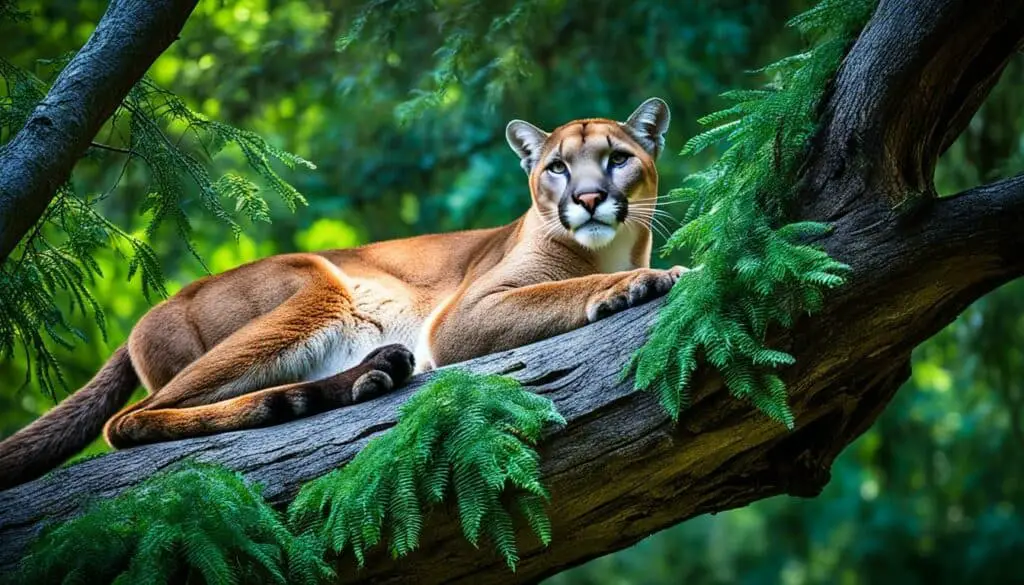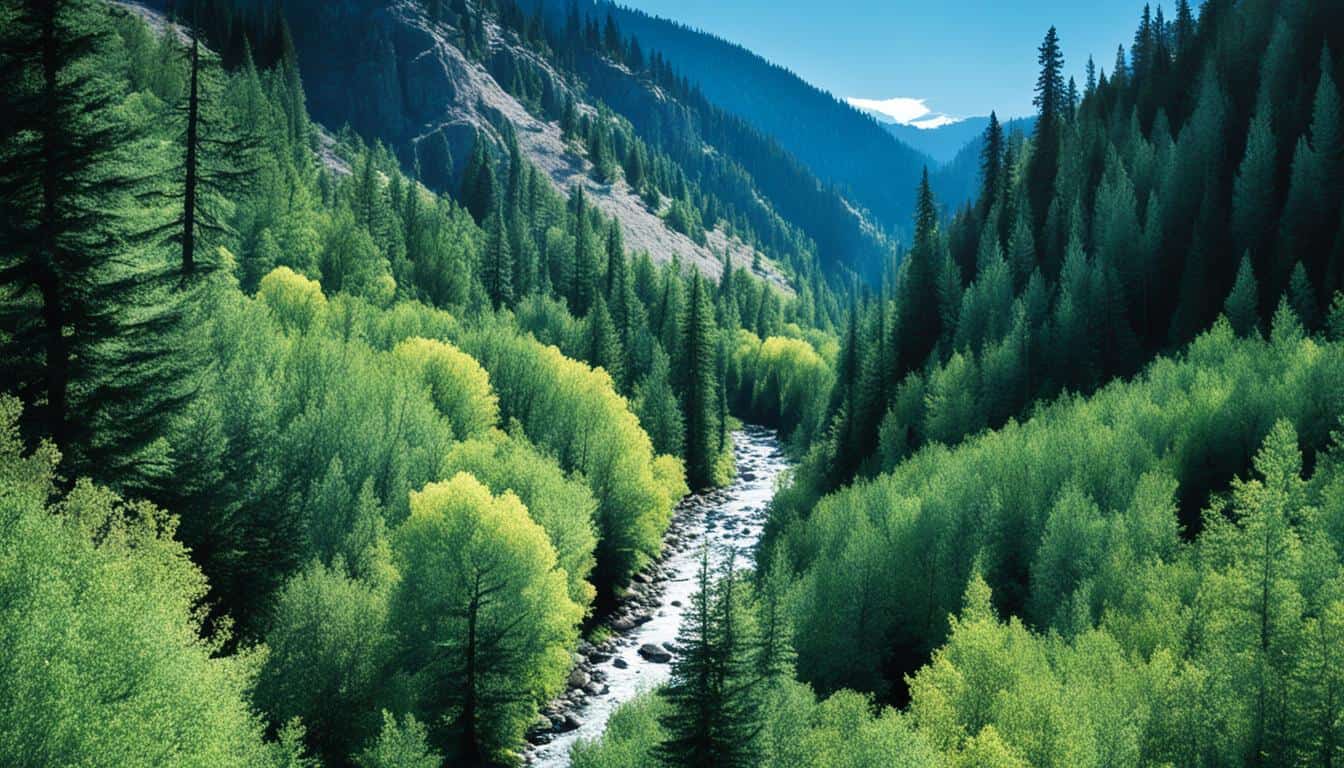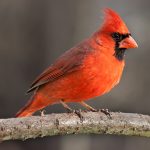Have you ever wondered how cougars, known for being agile and territorial, pick their homes? These cats are also called mountain lions, pumas, and panthers. They show interesting choices for where they live. They can be found from the thick Northwestern Canada forests to the rough lands of South America’s Patagonia. This reflects their adaptability and ways to survive.
So, what makes a home right for a cougar that can jump 18 feet up and 40 feet forward?
Join us in exploring why these solo hunters, with males marking off territories of 50 to 150 square miles, select specific places to live. See how their sharp senses help them find the best habitats. These areas support their hunt for prey.
Introduction to Cougar Habitats
Cougars are top predators, often hard to spot, in the wild. They can live in many places and it’s key to know where they do best. They do well in mountains, forests, and near rocks. These areas let cougars live and hunt effectively.
Also called pumas or mountain lions, cougars live across the Americas. Yet, their home areas are getting smaller because of people. Cougars need big areas to hunt and stay safe.
Saving their wild spaces is crucial. Western Canada, for example, works hard to keep cougar homes safe. This helps keep enough wilderness for cougars to live well.
Cougars pick their homes based on food, shelter, and avoiding people. Without these, they might get too close to places where people live. This can make their homes become even smaller.
Knowing what places cougars like can guide us in helping them. By taking care of their key areas, we help the whole ecosystem. This makes life better for cougars and other animals.
Mountainous Terrain
Mountains are perfect for cougars. They have different heights plus rocky hiding spots. This is exactly what cougars like. It helps them hunt and stay safe from danger.
Cougars choose high spots to keep an eye on their area. From up there, they can spot prey easily. The rough ground lets them move quickly and quietly, which is key in these steep places.
| Key Features | Benefits for Cougars |
|---|---|
| Elevation Variation | Enables strategic hunting and territorial surveillance |
| Rocky Features | Provide shelter and concealment from predators |
| High Vantage Points | Facilitate better prey detection |
| Steep Gradients | Allow cougars to utilize their agility and stealth |
Mountains are perfect homes for cougars. The rough and changing land meets their needs well. It also fits their need for space, making it a great place for them to live.
Coniferous Forests
Coniferous forests are key in the ecosystem, especially for cougars. These areas are vital for cougars’ life cycles. They give cougars shelter and a lot of prey to hunt.
Dense Vegetation
The dense plants in coniferous forests help cougars hide. It lets them blend in well and stay out of sight when they hunt. These areas, with lots of underbrush and tall trees, are perfect for sneaking up on prey.
Prey Availability
Another important thing about these forests is their many kinds of prey. They’re filled with animals like deer and elk, which cougars need to eat. Staying in these places ensures that cougars can always find food, supporting their lives and territories.
Rocky Outcrops
Rocky outcrops are top choices for cougars. That’s because they offer unique pros. These rugged spots are safe hideouts and perfect for watching over areas.
Cougars love to nest in rocky areas. The strong rocks shield them from bad weather and enemies. This kind of natural home keeps their babies safe and sound.
These areas are also key for hunting. Rocks help cougars hide so they can get close to prey. This makes rocky homes important for cougars’ hunt successes.
| Feature | Benefit | Summary |
|---|---|---|
| Protection | Shield against elements and predators | Ensures safety for denning and raising young |
| Camouflage | Allows effective stalking of prey | Improves hunting success rates |
| Elevation | Strategic vantage points | Enhances territory surveillance |
In short, cougars pick rocky areas for good reasons. They offer safety, better hunts, and strategic views. These spots are crucial in the life of cougars and how they survive.
Swamps and Wetlands
Swamps and wetlands aren’t the usual homes for cougars. But, they are great for hiding. These areas have thick plants and lots of waterways.
This makes it easy for cougars to conceal themselves. It helps them stalk prey without being seen. They can avoid humans too.
Cover and Camouflage
Thick plants and dark water let cougars sneak up on prey. Mountain lions in these places are good at hiding. They avoid being noticed by people, reducing danger.
| Features | Benefits for Cougars |
|---|---|
| Dense Vegetation | Provides effective camouflage for stalking prey |
| Waterways | Offers secluded areas away from human activity |
| Availability of Prey | Sustains cougar populations with sufficient food sources |
| Less Human Presence | Minimizes the risk of human-cougar conflicts |
For mountain lions, these wetlands are ideal places. They get to hide well and find food easily. It’s a key to their survival.
Large Uninterrupted Stretches of Land
Cougars need big areas with no interruptions to live well. These big spaces let them live alone and find food easily. They each need a lot of room, with some needing from 50 to 150 square miles for hunting and living. This big size helps stop fights over food and space.
In these large areas, cougars can hunt the animals they need to eat. They look for deer, elk, and more across their land. With plenty of room to move, they can follow their prey easily and find safe places to rest.
It’s very important that there aren’t too many cougars in one place. Overcrowding leads to fights and makes it hard for them to survive. These big, uninterrupted areas help keep cougar populations healthy by making sure they have enough space. By saving their natural homes, we help keep cougars safe and well in the wild.
Caves and Rock Crevices
It’s important to know where cougars like to stay for their protection. Caves and rock crevices are key parts of their homes. These places offer safety and are perfect for raising their young.
Protection from Elements
Cougar homes in caves keep them safe from tough weather. They stay cool in summer and warm in winter. The rocks shield them from wind, rain, and snow, keeping these big cats safe.
Safe Denning Locations
Mountain lions need a safe place to raise their young. Caves and crevices are perfect for this. They are private and away from danger. This keeps cougar kittens safe from harm.
Dense Thickets
Dense thickets are key for cougars, providing vital cover for their hunting ways. They are areas full of dense vegetation where cougars can hide and stalk prey without being seen. This concealment is crucial for their success, as they are solitary predators.
These places are also important to keep humans away, as human activities keep getting closer to natural habitats. The thickets’ tangled and dense nature makes them great for hiding, helping cougars avoid human contact. This is good for both the cougars and people, reducing potential risks.
For cougars, these dense areas are more than just a hiding spot. They are a safe haven for raising their babies. The cover keeps the young ones safe from other animals and humans alike. This privacy greatly boosts the survival chances of cougar cubs.
Dense thickets not only offer concealment but also contribute to the overall wellbeing and sustainability of cougar populations.
Preserving these dense thickets is crucial in saving cougar homes. By ensuring the protection of these areas with complex vegetation, we can help cougars persist in the wild for years to come.
Under Uprooted Trees
Cougars often choose uprooted trees as safe places. The way these trees are shaped makes a perfect hidden spot. Below the tree’s base, cougars stay away from danger and bad weather.
The hidden area under these trees is great for cougars to rest and look after their babies. It’s unmatched for privacy and it’s near their hunting areas too.

Seclusion and Safety
Uprooted trees act as natural forts for cougars. They don’t just keep the cougars safe from weather. They also give them a hidden place, which is vital for their survival.
These shelters help cougars stay safe from other animals. They also help the cougars get close to their prey without being seen.
| Benefits | Description |
|---|---|
| Hidden Shelter | Provides cover from predators and weather. |
| Secluded Den | Acts as a safe space for raising offspring. |
| Proximity to Hunting Grounds | Ensures easy access to prey for sustenance. |
Human-Avoidant Behavior in Habitat Selection
Cougars, also known as mountain lions, choose habitats that are far from humans. They naturally try to stay away from people. This influences where they live. They like areas with lots of plants, hills, and open space. These places help them hide and avoid us.
For those working to save these big cats, knowing where they like to live is key. By saving their favorite hiding spots, we can keep their numbers up. Plus, we can lower the chances of running into them. This means making areas safe for them, planting more green space, and asking people to stay out of their homes.
It’s vital that we pitch in to save the homes of cougars. Their survival means a lot for the world’s balance. Saving their land is not just for them. It helps many other plants and animals survive too. With more of us taking up space, it’s now more important than ever to help nature and big cats live together safely.
FAQ
What types of habitats do cougars prefer?
Cougars like areas such as mountains, forests, and swamps. They also enjoy places with large territories and few people. These spots help them hunt and stay safe.
What are mountain lions’ preferred habitats?
Mountain lions love living in the mountains and forests. These places offer good hiding spots and plenty of food. Rocky outcrops give them great places to rest and watch for prey.
What are ideal cougar habitats?
Ideal cougar homes have a lot of cover, food, and privacy. This includes mountains, forests, and rocky areas. They need big spaces to keep their own territory.
What constitutes the best cougar habitats?
The best homes for cougars have lots of deer and elk to eat. They also need places like caves to live in. Mountains and forests are perfect for them because they offer both food and hiding places.
How do cougars select their habitats?
Cougars pick their homes based on where they can find food to eat. They also choose places with good hiding spots and room to move. It’s important their place is quiet with few people around.
Why is mountainous terrain an ideal habitat for cougars?
Mountains are great for cougars because they can hunt from high up. The rocks in the mountains are good for hiding and looking out for food. This terrain is perfect for their lifestyle.
What role do coniferous forests play in cougar habitats?
Coniferous forests are important because they provide cover for cougars. They allow the mountain lions to hide and hunt. The forests are also full of deer and elk, giving the cougars plenty to eat.
Why are rocky outcrops favored by cougars?
Rocky areas protect cougars and offer a good view. They’re private places perfect for hunting. Cougars like to stay hidden when watching or chasing their prey.
Do cougars inhabit swamps and wetlands?
Some cougars do live in swamps and wetlands. These areas are hidden and offer a good place to find food. They also help the cats stay unseen from people and prey.
Why do cougars need large uninterrupted stretches of land?
Big open spaces are essential for cougars to survive. They need room for their territory and to find enough food. This large area reduces fighting over food and space.
How do caves and rock crevices benefit cougars?
Caves and crevices keep cougars safe from danger. These places are great for raising their young. They offer protection and peace for the cats.
What advantages do dense thickets offer as cougar habitats?
Thick bushes hide cougars well, making hunting easier. The cover protects the cats. It also means they can move without being seen by their prey or people.
Why do cougars seek shelter under uprooted trees?
Uprooted trees give cougars a private, safe place to rest. This shelter is perfect protection from the weather. It’s also ideal for keeping their young safe.
How does human-avoidant behavior influence cougar habitat selection?
Cougars seek homes far from humans to stay safe. They like quiet, secluded places. It’s important we help keep these areas safe for cougars. This helps them live well and avoids problems with people.







